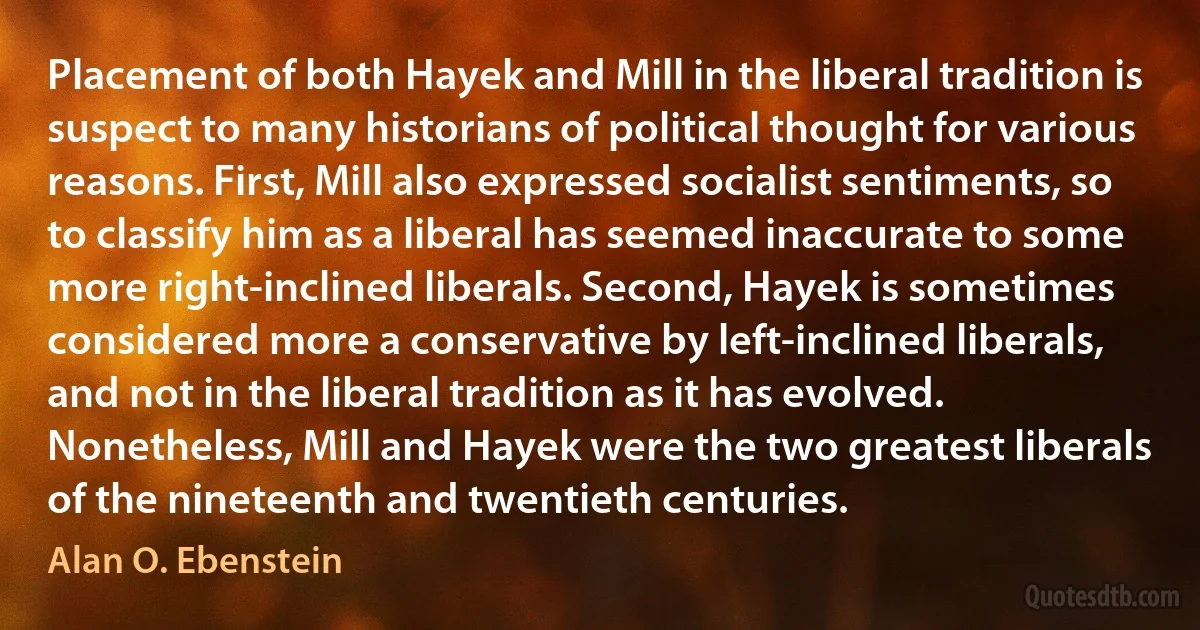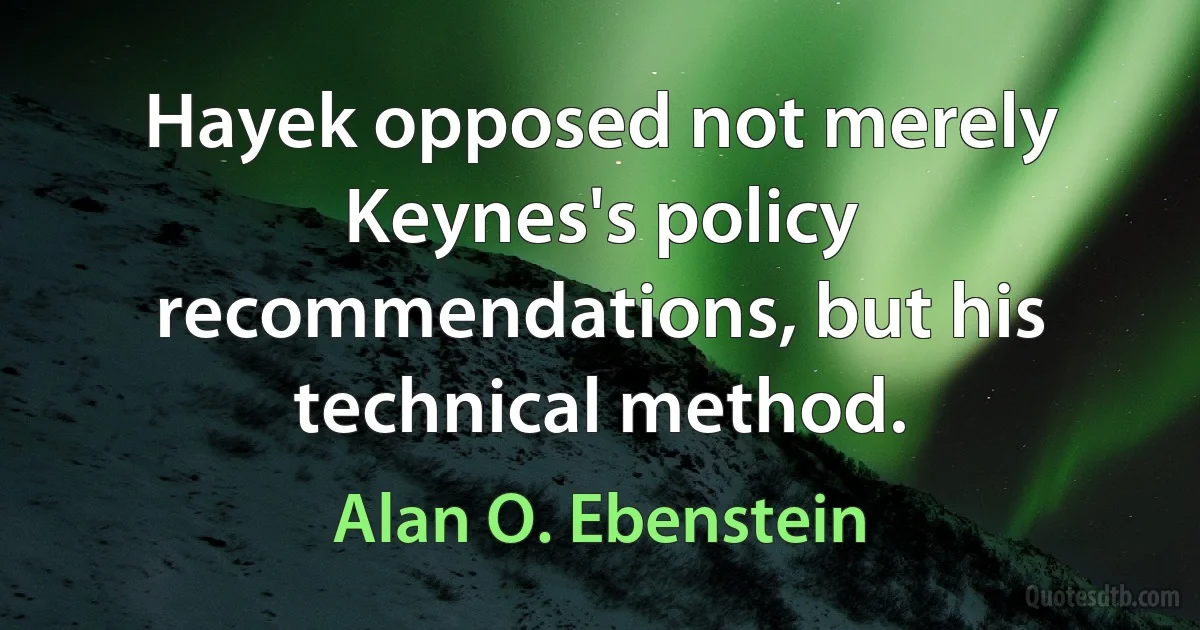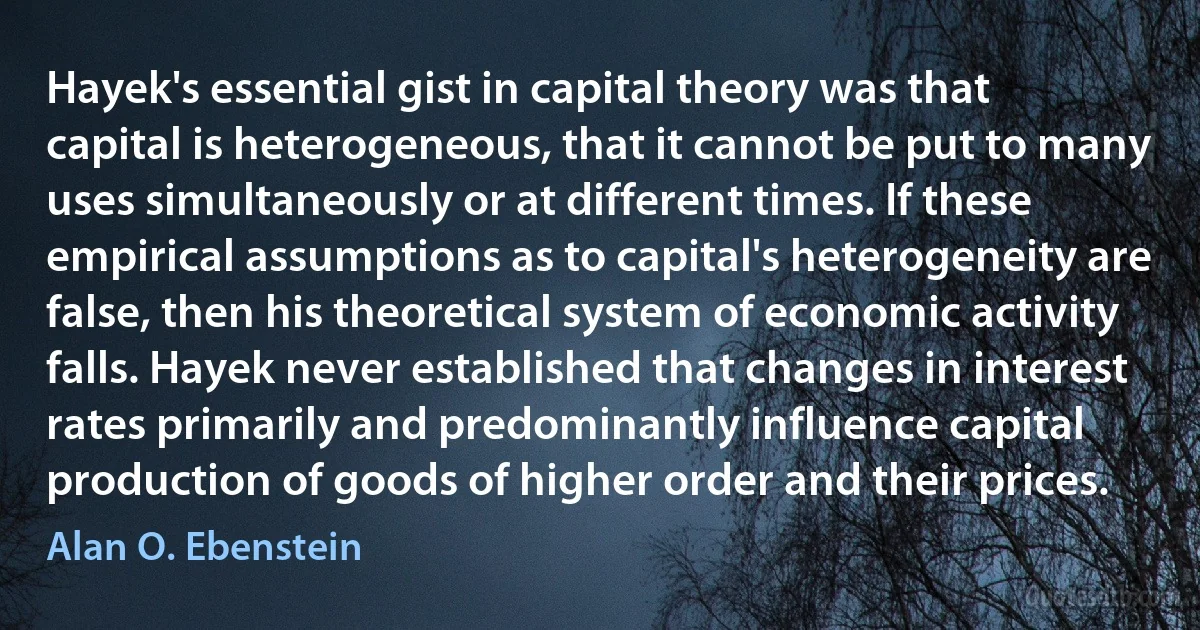Hayek Quotes - page 3
Hayek emphasized the importance of rules. He thought that what society should do is not to direct the individual in his or her particular actions, but to create a metaphysical structure, as it were, enforced by rules or laws, that create stable expectations and thus allow rational action.

Alan O. Ebenstein
Hayek expressed the greatest praise for Popper. Whether this was Hayek's ultimate view or a reflection of a deep, though subordinate, strain of personal modesty and humility that ran through him is an open question. Hayek's support was vital in Popper's career. During the late 1970s and early 1980s, Hayek was involved with an unsuccessful effort to obtain the Nobel Prize in Literature for Popper.

Alan O. Ebenstein
Hayek expressed more fully and deeply than Mises the epistemological argument for free market order. The crucial issue for Hayek became not that without prices individuals cannot calculate (though he thought this to be the case), but that the division of knowledge renders centralized control of an economy or society impossible.

Alan O. Ebenstein
True and false individualism differ, according to Hayek, not primarily about values but about facts. The question of how societies are actually ordered or organized separates them: Are communities created, or do they evolve? The answer is obviously some combination of the two, but the relative weighting is of the greatest importance.

Alan O. Ebenstein
Hayek, highly influenced by Mach as a young man, began reading him immediately following his return from service in World War I. He remarked about four decades later that he was "stimulated by Mach's work to study psychology and the physiology of the senses,” though his interest in these areas derived as much from disagreement as agreement with Mach's work.

Alan O. Ebenstein
Hayek did not believe that the same sort of prediction-and therefore control-that is possible in the natural sciences is attainable in the realm of society. At best, he thought, only a "pattern” of the future can be predicted in social life. He thought that to attempt to formulate laws of societal development akin to the laws of the physical sciences, as Marx attempted, is doomed to failure.

Alan O. Ebenstein
Although Hayek would have protested being characterized as a democratic welfare statist in The Constitution of Liberty, this is what he was. While he favored less government rather than more, government at the local level rather than national level, the provision of social welfare through private charitable organizations rather than government at any level, and the private competitive provision of government services, there was much in his work that any modern, twentieth-century liberal could support.

Alan O. Ebenstein
Hayek was too harsh on Freud. It is, indeed, one of the surprising facts of the development of intellectual thought during the twentieth century that Freud-who was so pervasive and dominating during the first half of that century-virtually dropped off the face of the map during the second half. Hayek was almost the last person still talking about Freud, in the sense of taking him as a serious living influence on civilization.

Alan O. Ebenstein
During World War II it was exciting and unexpected for Hayek to find someone else, from Vienna, who was interested in many of the same topics that he was. The Open Society and Its Enemies has three main parts, on Plato, Hegel, and Marx. The next main chapters in Hayek's uncompleted "The Abuse and Decline of Reason,” on which he was at work then, were to be on Hegel and Marx. In addition, Popper's scholarly style was similar to Hayek's, with extremely extensive notes.

Alan O. Ebenstein
Hayek truly did get Popper his position at the London School of Economics. "I am personally anxious to get Dr. Popper to this School,” Hayek wrote Gombrich as early as 1943. Given the later prominence that Popper achieved for the school, this was one of Hayek's most significant contributions to its reputation, as well as the decisive career move in Popper's life.
Hayek also genuinely influenced Popper's political philosophy. While Popper always remained to Hayek's left, he started out much further to Hayek's left than he wound up, and this movement was in no small part the result of Hayek's influence. Popper was a charter member of the Mont Pelerin Society. He suggested, however, that socialists be brought into it. Hayek wrote Popper several deeply personal letters in connection with his divorce. It is likely that their personal relationship was more important to and valued by Hayek than Popper, though Popper valued highly Hayek's friendship.

Alan O. Ebenstein
One of the paradoxes of Hayek is that he wrote better than he thought. That is, his writing is often more suggestive and stimulating than the thought that underlaid it. While his writing is, stylistically, difficult, it is also exceptionally profound, and its value lies in its profundity.

Alan O. Ebenstein
Both Hayek and Locke thought that this is best achieved by limiting government's potential actions and restricting these potential actions to known general rules applicable to all. Both sought a government of rules rather than commands, the latter of which, by their nature, are not known in advance and may be arbitrary-not applicable to all. Hayek's goal was the society of law.

Alan O. Ebenstein
When Keynes's General Theory was published in February 1936, it obliterated all else on the scene in academic economics. Hayek was known to be working on a treatise on capital as Keynes's work was published (the work that became The Pure Theory of Capital). While there was some anticipation in academia for this forthcoming major work, interest even by economists in Hayek's work waned.

Alan O. Ebenstein
Hayek had high regard for Marx in technical economic theory and considered him a predecessor in his business cycle theory. [...] It was not in technical economic theory that the classical Austrians disagreed with Marx. So towering a figure in history is Marx that discussion of his thought in summary form is always difficult, for there is so much that he said and that others have said about him. At the same time, so tendentious, ill-spirited, and just plain wrong a thinker was Marx that it is surprising that he may have had some of the influence attributed to him. Hayek's opposition to Marx was in the realm of practical political emanations from Marx's thought. Here he considered Marx's influence to have been wholly pernicious.

Alan O. Ebenstein
The path away from economic freedom is, as Hayek long ago demonstrated, the road to serfdom. The road may be a long one: the pace may be swift or slow: but the destination cannot be changed. State ownership, state monopolies, state regulation and state planning, through the centralisation of economic power, inevitably lead to economic failure. They inevitably increase both the temptation and the scope for abuses of political power until freedom itself is threatened. The planned economies, the controlled societies which socialism requires, pervert what are truly economic decisions for the market into political decisions for the politician or the bureaucrat. The fruits of centralised economics are corruption, poverty and servility-and in the socialist society the only medicine which may be prescribed is heavier doses of the same socialist poison.

Norman Tebbit



